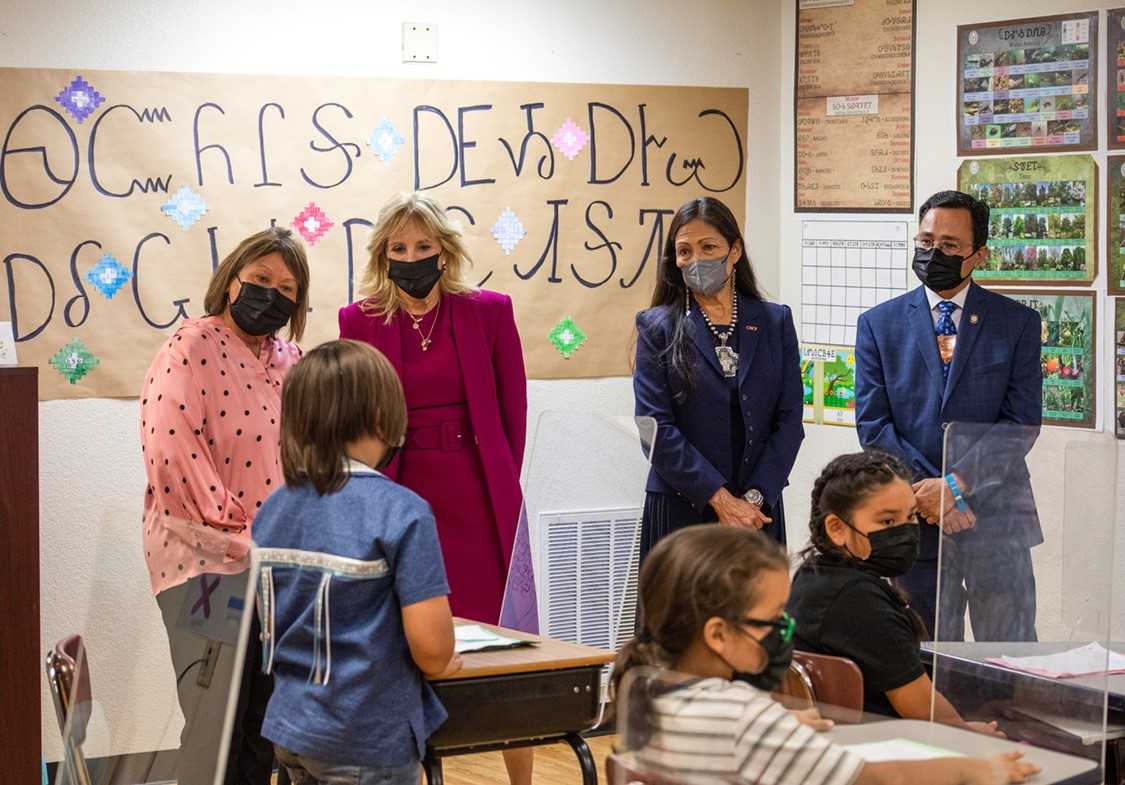
- Details
- By Native News Online Staff
First Lady Jill Biden and Interior Secretary Deb Haaland visited the Cherokee Nation on Friday. They were joined by several Cherokee Nation leaders, including Principal Chief Chuck Hoskin, Jr. and Principal Chief Bryan Warner, members of the cabinet, Council of the Cherokee Nation, Special Envoy for Language Joe Byrd, Executive Director of Language Howard Paden, Miss Cherokee Chelbie Turtle.
The visit was the third trip to a tribal nation for Biden since she became first lady of the United States in January 2021. She visited the Navajo Nation in April and the Saginaw Chippewa Indian Tribe in late October.
Want more Native News? Get the free daily newsletter today.
On Friday, Biden and Haaland visited the Cherokee Nation’s Cherokee Immersion School in Tahlequah, Okla. on Friday to a successful Cherokee language program. The Cherokee Nation has made historic investments to preserve and perpetuate the Cherokee language in 2019 through the Cherokee Nation Durbin Feeling Language Act.
The Act has paved the way for the tribe to build a new state-of-the-art language hub to house all Cherokee language programs in one facility. The Act is named in honor of the late Cherokee linguist Durbin Feeling, known as the greatest contributor to the Cherokee language since Sequoyah.
“As an English teacher, I have always believed that language is not just a collection of words. Language has the power to create, defining the shades of our joy and sorrow, dividing what matters from the mundane. It helps us tell the story of our culture and traditions -- containing the wisdom of the world that only we know. It connects us to our faith, naming the divine and our relationship with it. It is a thread weaving through the past, present, and future -- the inheritance of our ancestors and a gift we give to our children. The ability to speak our own truth in our own words is power,” First Lady Biden said.
Donate today so Native News is free for all readers.
Since January, the Biden Administration has appropriated $220 million to assit tribal nations in Indian Country to protect and preserve Native languages.
“It’s amazing to be at the Cherokee Immersion School with our First Lady Dr. Jill Biden to highlight an issue that is close to my heart,” Secretary Haaland said. “Our Indigenous languages are an important part of our culture and who we are as a people. Our languages connect us to our ancestors and to our homelands and help us share indigenous knowledge from generation to generation. Many of our languages are at risk from being lost. That’s why Native language preservation is so important and we are taking action.”
Friday’s visit came just over two weeks after First Lady Biden introduced The White House Native Language Memorandum of Agreement (MOA) at the 2021 Tribal Nations Summit. The MOA was signed by the Departments of Education, Health and Human Services, the Interior and numerous other federal agencies to help promote collaboration on programming, resource development and policy related to Native languages
“I want to thank First Lady Dr. Biden and Secretary Haaland for visiting the Cherokee Nation Reservation and seeing first-hand how our Cherokee Language Department is not just preserving our precious Cherokee language, but finding innovative ways to perpetuate it so that it remains the lifeblood of Cherokee culture for generations to come,” Chief Hoskin said.
More Stories Like This
10 Years of Building Business Dreams for Indigenous WomenIchigo Foundation Awards American Indian College Fund Adult Education Program
Bard College Center for Indigenous Studies (CfIS) Hosts Annual Symposium With Keynote Speaker Miranda Belarde-Lewis on March 9–10
American Indian College Fund Announces Spring 2026 Faculty Fellow Cohort
Navajo Nation Signs $19 Million Diné Higher Education Grant Fund Act into Law
Help us defend tribal sovereignty.
At Native News Online, our mission is rooted in telling the stories that strengthen sovereignty and uplift Indigenous voices — not just at year’s end, but every single day.
Because of your generosity last year, we were able to keep our reporters on the ground in tribal communities, at national gatherings and in the halls of Congress — covering the issues that matter most to Indian Country: sovereignty, culture, education, health and economic opportunity.
That support sustained us through a tough year in 2025. Now, as we look to the year ahead, we need your help right now to ensure warrior journalism remains strong — reporting that defends tribal sovereignty, amplifies Native truth, and holds power accountable.
 The stakes couldn't be higher. Your support keeps Native voices heard, Native stories told and Native sovereignty defended.
The stakes couldn't be higher. Your support keeps Native voices heard, Native stories told and Native sovereignty defended.
Stand with Warrior Journalism today.
Levi Rickert (Potawatomi), Editor & Publisher

